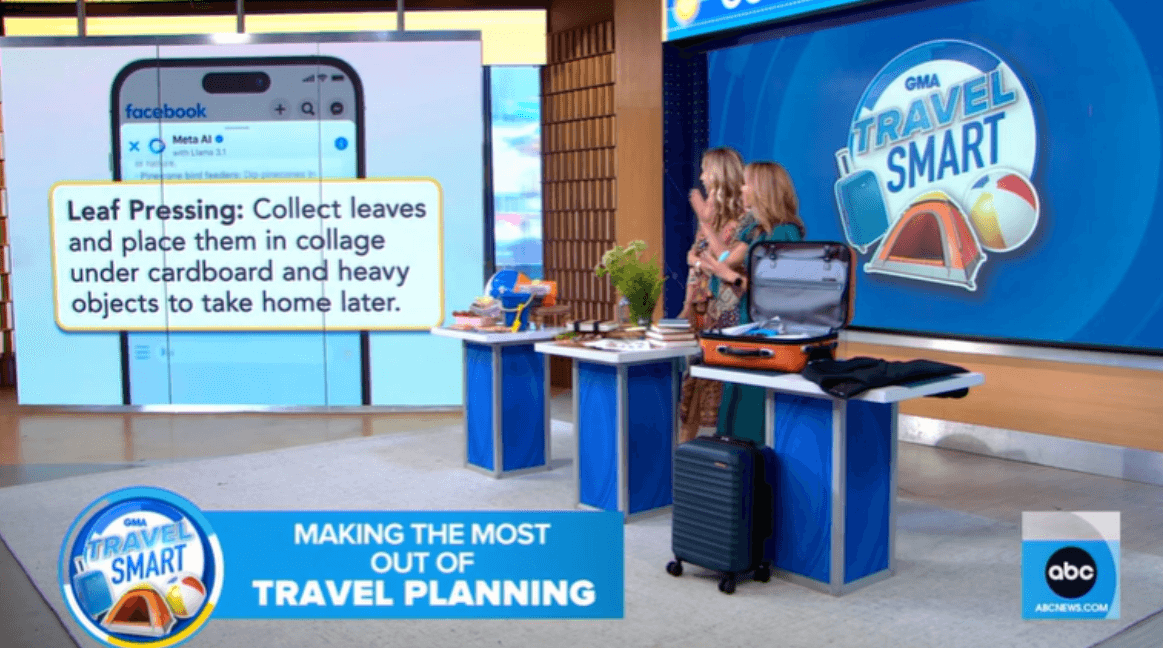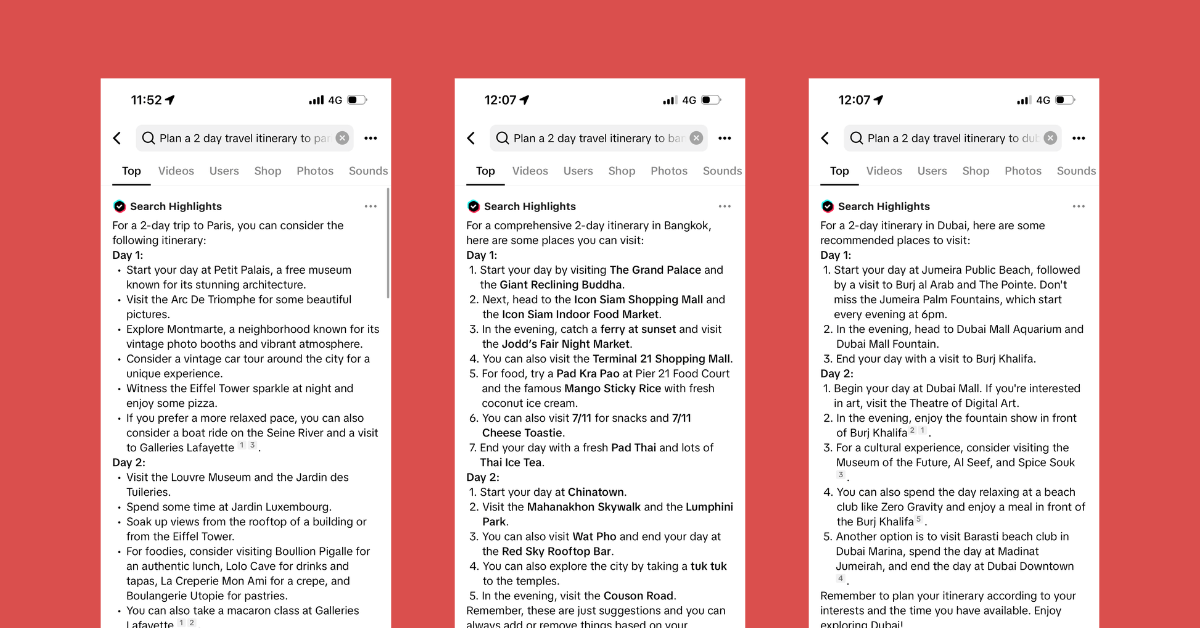How Meta & TikTok are changing travel planning and discovery
In the competitive travel industry, organic traffic through SEO is a crucial driver of current and potential visitors for most travel businesses.
With the industry’s value at approximately $9.5 trillion in 2023, it’s attracted the attention of major tech leaders like Google and Meta. These companies aim to capture a larger share of this profitable market through artificial intelligence (AI) advancements, by transforming how consumers search, plan, and book their travel.
AI has the potential to revolutionise travel planning. This technology makes the experience more personalised and intuitive, while platforms like TikTok bring a dynamic, multi-modal angle approach to how travellers discover, plan, and share their journeys.
Let’s explore and compare Meta AI and TikTok, set them a travel discovery challenge, and analyse the results.
Meta AI
Travel discovery and planning has been a key focus for Meta since the introduction of Meta AI.
Meta’s broad product ecosystem — including Facebook, WhatsApp, and Instagram — already serves a range of social needs. By adding Meta AI into this ecosystem, Meta aims to streamline the travel planning process. This reduces the need for users to switch to other platforms like Google.
Imagine you’re in a WhatsApp group discussing a weekend getaway. You’d begin in WhatsApp, then head to Google or Bing to research accommodation or activities before sharing links back in WhatsApp. With Meta AI, users can receive travel recommendations and information directly, keeping them in the Meta ecosystem.
While AI is new and not yet universally trusted, Meta is actively working to normalise its use in daily lives and boost its reputation as a trustworthy asset. This feature on Good Morning America from August 2024 is a great example:

As Meta’s already substantial userbase begins to become accustomed to its AI elements, we can expect more users to rely on Meta’s platforms to discover brands and plan travel activities. This will gradually reduce users’ dependence on Google and Bing.
TikTok
In May this year TikTok reached 1.04 billion users, but trends show that account growth is beginning to slow. This shift likely signals that TikTok is reaching the peak of its user adoption curve, transitioning from the early majority to the late majority of adopters.
However, TikTok’s potential for continued growth lies in expanding beyond entertainment to include broader functions — particularly search and social, which are traditionally dominated by other platforms.

TikTok is very popular with Gen Z and millennial travellers, but it’s also seeing increased interest from older generations, who are turning to TikTok for travel discovery and inspiration. Danielle Johnson, Group Vertical Director of Travel at TikTok, has frequently highlighted TikTok’s evolving user base.
A fascinating trend among this older group is ‘destination dupes,’ where they explore new, similar experiences to places they’ve already visited, like substituting Italy with Croatia.
The “is TikTok a search engine?” debate has been discussed in the SEO industry for over a year, but, ultimately, the answer doesn’t matter. With search becoming increasingly multi-modal and AI-powered, it’s essential to recognise how platforms like TikTok are reshaping how users discover brands and engage with content.
TikTok & Meta travel discovery trends
To understand how Meta AI and TikTok might impact travel businesses, it’s crucial to know how these platforms present information and identify potential areas of risk.
We asked Meta AI and TikTok to provide information and generate two-day travel itineraries for 50 different locations across five regions.
Meta AI travel responses
Meta AI returned 1,047 “things to do” across the five regions, with a hallucination rate of 0.76%. There were eight fictitious locations included in its responses.
Most results focused on North America, while Africa had the fewest. The distribution was fairly balanced across regions, with the mean being 209. They ranged from a high of 239 and a low of 191.
| Meta AI | Itinerary Suggestions | “Fake” Suggestions | “Bad” Suggestions |
| Europe | 200 | 1 | 0 |
| America/Canada | 239 | 1 | 2 |
| Middle East | 209 | 3 | 1 |
| Asia/Oceania | 208 | 3 | 2 |
| Africa | 191 | 0 | 1 |
TikTok travel responses
TikTok generated 267 “things to do” across the five regions, with a hallucination rate of 1.5% due to four fake locations.
As with Meta AI, most responses were for North America, but this was heavily disproportionate to the number of responses for other regions. North America received 117 responses, while Europe and Asia/Oceania received 72 and 60 respectively.
| TikTok Search | Itinerary Suggestions | “Fake” Suggestions | “Bad” Suggestions |
| Europe | 72 | 4 | 7 |
| America/Canada | 117 | 0 | 0 |
| Middle East | 9 | 0 | 0 |
| Asia/Oceania | 60 | 0 | 0 |
| Africa | 9 | 0 | 0 |
In stark contrast, Africa and the Middle East received only nine responses each, with some confusion around specific queries. Outside of Dubai and Cape Town, TikTok failed to provide detailed suggestions for other destinations in these regions.
For example:
- when we asked for a two-day itinerary for Abu Dhabi, TikTok repeatedly confused Abu Dhabi with Dubai.
- queries for locations like Malé, Nairobi, Malawi, and Botswana resulted in responses more aligned with general queries for “how to travel”.
However, for locations like Honolulu, Tokyo, Montreal, and Phuket, TikTok delivered results that exceeded expectations, with detailed, relevant suggestions.
Compared to other LLMs
We compared Meta AI and TikTok to other large language models (LLMs) and generative AI tools — including Microsoft Copilot, Google AI Overviews, and classic ChatGPT. Meta AI’s response rates were higher than all of them.
For the same 50 destinations and itinerary requests, Meta AI’s 1,047 responses more than doubled the output of classic ChatGPT (493 responses) and Microsoft Copilot (448).
All LLMs tended to favour North America and Europe in their responses, with fewer suggestions for the Middle East and Africa.
While most users still view AI technologies with scepticism, Meta AI and TikTok are actively working to normalise AL in daily life, paving the way for increased adoption. As this trend continues, we expect users’ travel research and planning habits to shift further toward AI-driven solutions.
Get in touch today for expert guidance on how AI and TikTok can futureproof your travel SEO strategy.